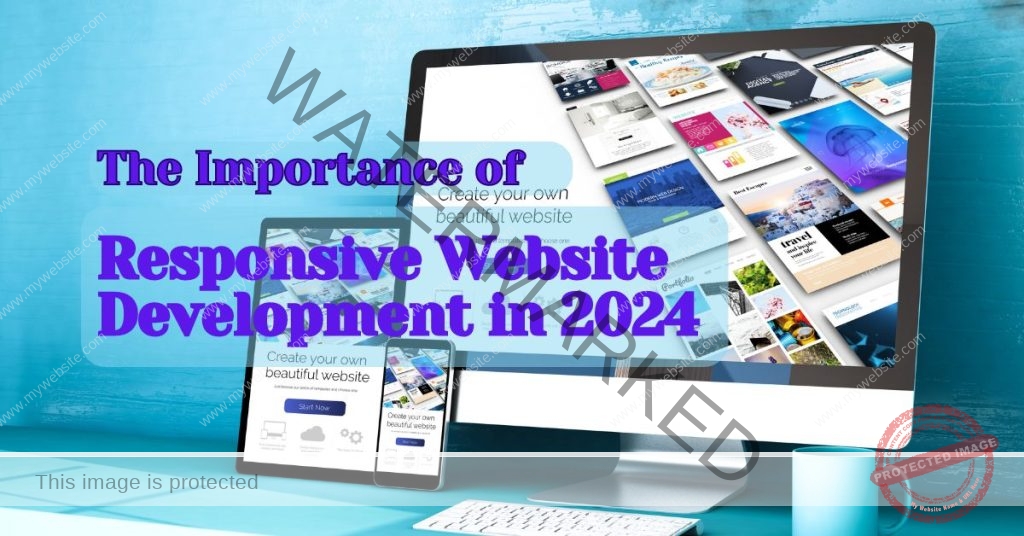As a digital marketing expert specializing in business growth and digital transformation, I’ve seen firsthand how responsive website development can make or break a business’s online presence. In 2024, it’s more critical than ever to ensure your website is responsive, providing an optimal experience across all devices. Whether you’re a business owner or a marketer, understanding and implementing responsive design is essential for staying competitive. Here’s why responsive website development is so important in 2024.
Understanding Responsive Website Development
What is Responsive Website Development?
Responsive website development involves designing and building websites that adapt seamlessly to different screen sizes and devices. This approach ensures that users have a consistent and engaging experience, whether they’re on a desktop, tablet, or smartphone.
Key Components of Responsive Design
- Fluid Grids: Use relative units like percentages instead of fixed units like pixels to create layouts that resize smoothly.
- Flexible Images: Ensure images scale and adjust within the layout without breaking the design.
- CSS Media Queries: Apply different styles based on the characteristics of the device, such as its width, height, and orientation.
Evolution of Web Design
The shift towards responsive design began as mobile internet usage surged. Initially, separate mobile sites were created, but they often led to fragmented user experiences. Responsive website development emerged as the solution, allowing a single website to provide a consistent experience across all devices.
Mobile-First Indexing and SEO Benefits
Google’s Mobile-First Indexing
Google has shifted to mobile-first indexing, meaning it primarily uses the mobile version of a site for ranking and indexing. This change underscores the importance of having a mobile-friendly, responsive website.
SEO Advantages
- Improved Search Engine Rankings: Responsive sites are favored by search engines, improving visibility and ranking.
- Better User Experience: A seamless experience reduces bounce rates and increases the time users spend on your site.
- Reduced Bounce Rates: Users are less likely to leave a site quickly if it’s easy to navigate on their device.
Personal Anecdote
One of my clients, a local retail store, saw a 50% increase in organic traffic after transitioning to a responsive design. The improvement in mobile user experience directly contributed to their enhanced search engine rankings and overall traffic.
Enhanced User Experience
User Expectations
In 2024, users expect websites to work flawlessly on any device. A responsive design ensures that your site meets these expectations, providing a positive experience that keeps users engaged.
Navigation and Accessibility
Responsive website development simplifies navigation and accessibility, making it easier for users to find what they need quickly. This ease of use can lead to higher satisfaction and loyalty.
Impact on Conversion Rates
Responsive websites often see higher conversion rates because users can easily complete actions like making purchases or filling out forms, regardless of the device they’re using.
Personal Anecdote
I worked with an e-commerce client who struggled with high cart abandonment rates on mobile devices. By implementing a responsive design, we made the checkout process smoother on smartphones and tablets, which significantly reduced abandonment rates and increased sales.
Cost Efficiency and Maintenance
Single Codebase
Maintaining one codebase for all devices simplifies updates and reduces the risk of inconsistencies. It’s more efficient than managing separate sites for desktop and mobile.
Cost Savings
Responsive website development can save money by reducing development and maintenance costs. You no longer need to build and maintain separate versions of your site.
Future-Proofing
A responsive site is better equipped to handle new devices and screen sizes that emerge, ensuring longevity and relevance in an ever-evolving tech landscape.
Personal Anecdote
A client in the travel industry faced high maintenance costs due to their separate mobile and desktop sites. Switching to a responsive design not only cut their costs but also improved their site’s performance and user experience.
Competitive Advantage
Staying Ahead of Competitors
In a competitive market, having a responsive website can set you apart. Users are more likely to engage with and trust a site that works well on their preferred device.
Brand Image and Credibility
A well-designed responsive website enhances your brand’s image and credibility. It shows that you care about providing a quality experience for all users.
Market Trends
Current trends in web design emphasize the need for responsiveness. Businesses that don’t adopt responsive website development risk falling behind.
Personal Anecdote
A startup I consulted for rebranded with a new responsive website. The modern, accessible design helped them stand out in their industry, leading to increased brand recognition and customer trust.
Impact on Digital Marketing Strategies
Cross-Channel Consistency
Responsive website development ensures that your website provides a consistent experience across all digital marketing channels, from social media to email marketing. This consistency is crucial for maintaining a cohesive brand image.
Improved Analytics
Tracking and analyzing user behavior across devices is easier with a responsive site. This data can inform your marketing strategies and help you better understand your audience.
Advertising and Conversion
Responsive design optimizes your digital advertising efforts by ensuring that users have a smooth experience when they click on your ads, leading to better conversion rates.
Personal Anecdote
A client’s digital marketing campaigns saw a marked improvement after their site was optimized for mobile. Ad click-through rates increased, and conversions from mobile users rose significantly, demonstrating the importance of a cohesive, responsive design.
Accessibility and Inclusivity
Web Accessibility Standards
Complying with web accessibility standards (such as WCAG) ensures that your site is usable for people with disabilities. Responsive website development can help meet these standards by providing a flexible, user-friendly interface.
Inclusive Design
Creating an inclusive design means considering all users, regardless of their abilities or devices. This approach can broaden your audience and enhance user satisfaction.
Legal and Ethical Considerations
Meeting accessibility standards isn’t just a legal requirement; it’s an ethical obligation to ensure that all users can access and benefit from your site.
Personal Anecdote
A client in the education sector saw an increase in enrollment after making their website responsive and accessible. This change opened their services to a wider audience, including users with disabilities.
Tools and Best Practices for Responsive Website Development
Essential Tools
- Bootstrap: A popular framework for building responsive websites.
- Google Mobile-Friendly Test: A tool to check your site’s mobile-friendliness.
- Media Queries: CSS techniques to apply styles based on device characteristics.
Best Practices
- Design for Mobile First: Start with the mobile design and scale up.
- Optimize Images: Ensure images load quickly and adjust to different screen sizes.
- Test Across Devices: Regularly test your site on various devices to ensure consistent performance.
Ongoing Trends
Stay updated with emerging trends and technologies in responsive web design, such as progressive web apps (PWAs) and advanced CSS frameworks.
Personal Anecdote
When developing a website for a tech conference, we used Bootstrap and extensive testing across devices to ensure a seamless experience for attendees. This attention to detail paid off, as the site received positive feedback for its usability and accessibility.
Conclusion
Responsive website development is no longer optional; it’s essential for business success in 2024. From enhancing user experience to improving SEO and reducing costs, the benefits are clear. By prioritizing responsive design, you can stay competitive, build credibility, and ensure your website is accessible to all users.
Call to Action
If you found this guide helpful and want to stay updated with the latest insights and tips on responsive website development, subscribe to our mailing list here or check out our affiliate link/service for more in-depth reviews and exclusive offers. Don’t miss out on the opportunity to enhance your web development strategy and stay ahead of the curve in 2024!
Additional Resources
Case Studies and Success Stories: Explore case studies and success stories of responsive website implementations.
Further Reading: Check out our articles on web design, SEO, and digital marketing strategies to enhance your responsive web development knowledge.










